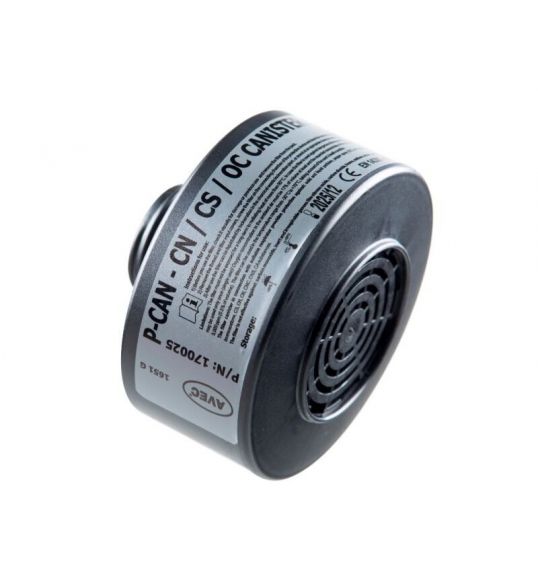The MIRA Safety P-CAN police gas mask filter is one of the world’s most advanced solutions for potential long-term exposure to riot control gasses including CS, CN, and OC.
Featuring the same basic characteristics as other MIRA Safety filters, these hydrophobic P3 police gas mask filters have almost 3 times as much activated carbon as competing filters, providing up to 12 hours of rock-solid, reliable protection, even in wet conditions.
The filters are produced with standard round threads according to STANAG 4155 (EN 148-1)- Rd 40 x 1/7". In addition to a shelf life of almost double than competing filters, they also meet EN 14387:2004 + A1:2008 standards for the removal of CS/CN gas in vapor form. Individual canisters are vacuum-sealed, dated, and black in color for easy identification in inventory.
Police in many American cities have come to realize that the filters that came with their standard riot gear start to saturate and fail fairly quickly.
That’s where our new P-CAN police gas mask filter comes in. Designed specifically with the needs of riot police in mind, it can withstand prolonged exposure to all major riot control agents—in practically all climates—with a shelf life that spans half an officer’s career.
Exposure to riot control agents and their lachrymatory effects is enough to take an officer out of action for up to an hour. The results can only make a bad situation worse.
Protect yourself with the most cutting-edge new police gas mask filter on the market today—MIRA Safety’s P-CAN filter.
Thanks to its hydrophobic P3 filter that’s embedded, these police gas mask filters can be exposed to sustained heavy rainfall without water ingress. They’ve been tested to perform at temperatures as low as -32° Celsius and exposed to temperatures of up to 159° Fahrenheit. They’re also functional in a full range of humidity—from 5% all the way up to 100%. Salt breeze will not deteriorate the filter, but prolonged exposure will limit it to a service life of 12–24 hours maximum.
The filters are sealed in plastic bags by the manufacturer. Store the filters unopened in a clean area with an even temperature, preferably 23 to 86°F (-5 to +30°C) and relative humidity below 80%. The storage period (month and year) for filters is clearly marked on the filter label. Do not try to regenerate the filters. Never clean the filters with compressed air or compressed water.
After use, remove from the respirator and treat the filter as special refuse and dispose of as solid waste in accordance with current waste treatment regulations based on the substance(s) filtered (gasses or particles). Please consult the appropriate local authority and/or regulations for disposal advice and locations.





